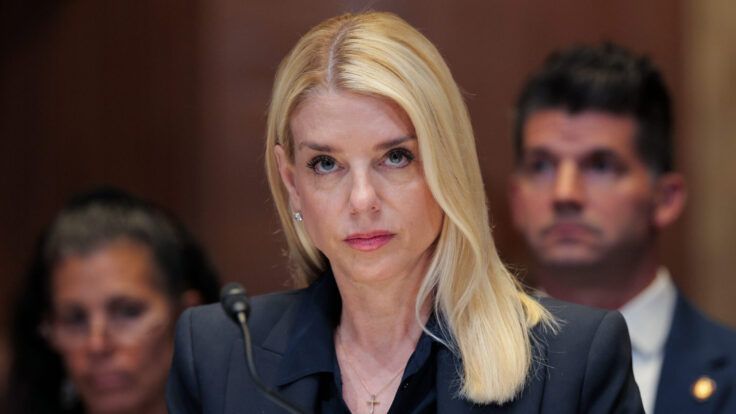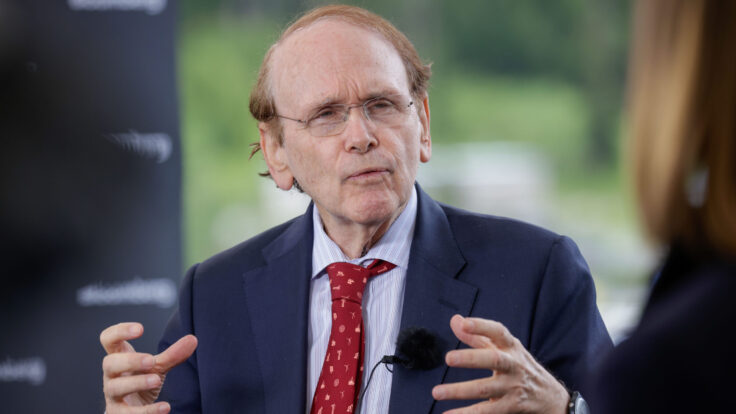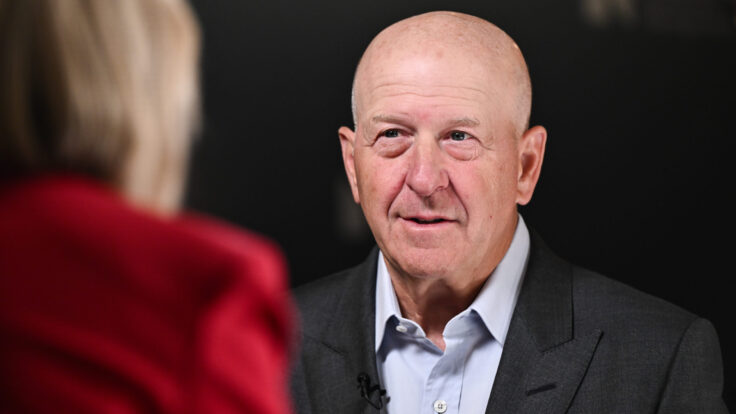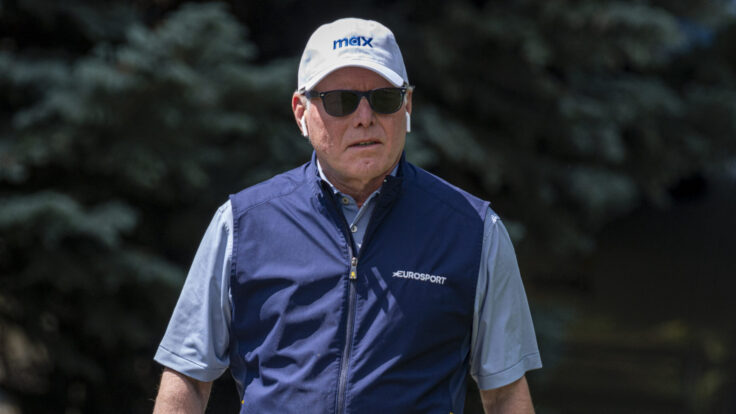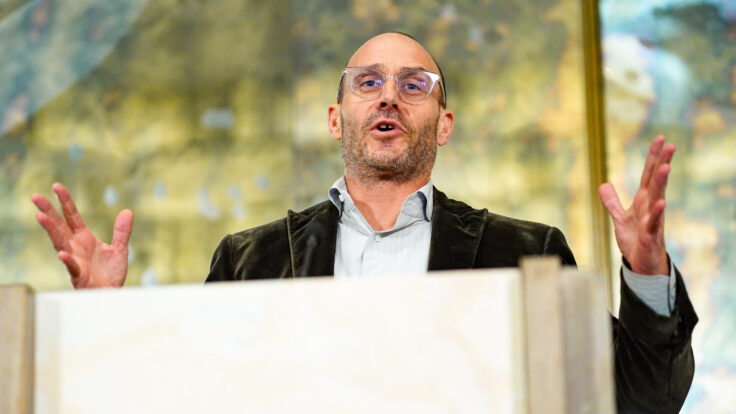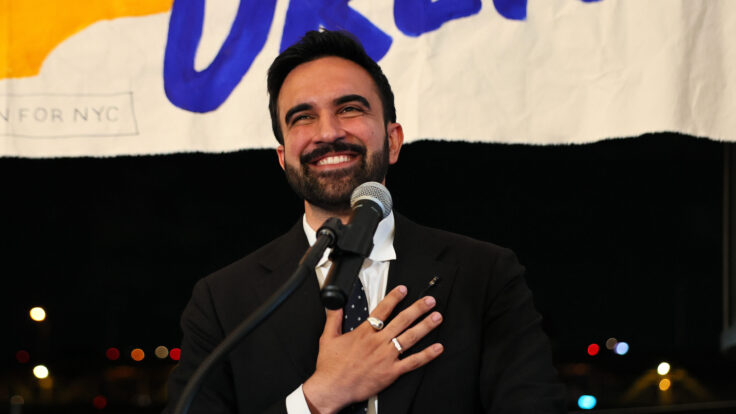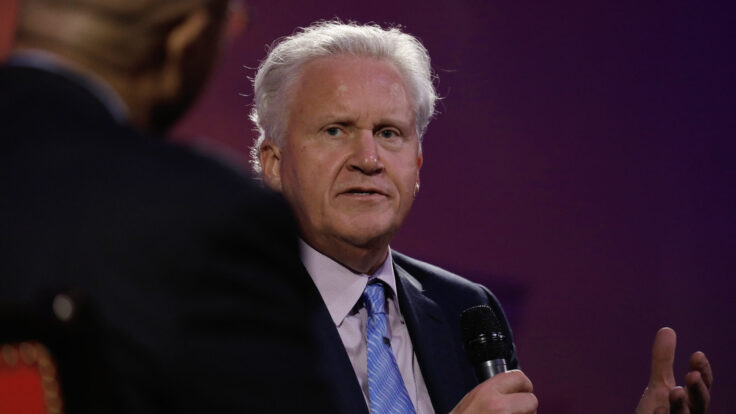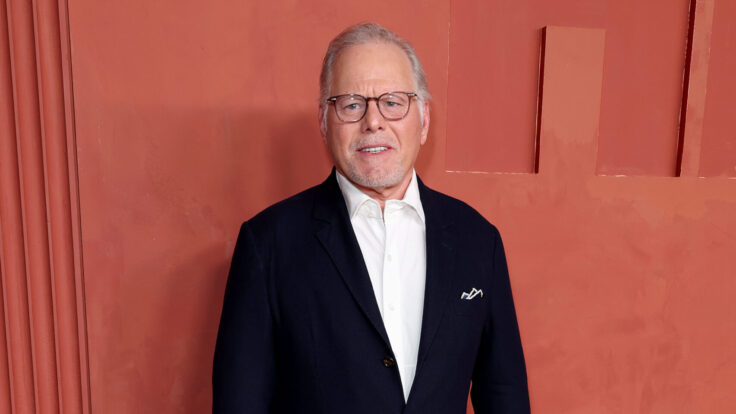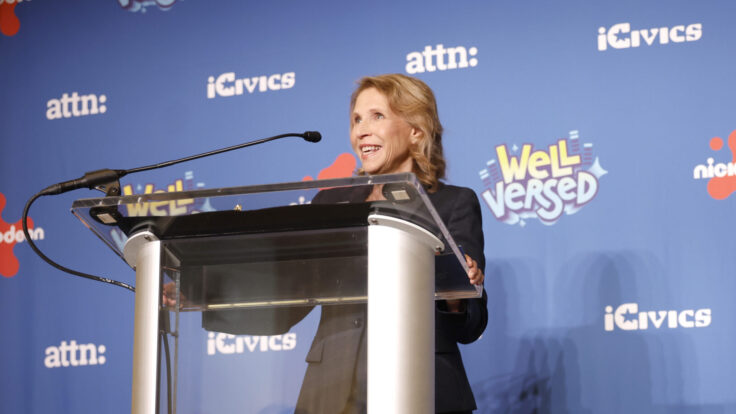Welcome back to Dry Powder. Happy Wednesday, and thanks as always for subscribing to Puck. In today's column: What my Wall Street sources are saying about what Shari Redstone can do to flip Paramount Global to the highest bidder—and how some creative private equity dealmaking might help to get it done.
Thoughts, tips, feedback? Your response to this email goes directly to my inbox. Thanks, Bill |
|
|
Redstone likely can’t sell Paramount Global—oh, that name—until she finds a way to offload its signature news assets. For private equity dealmakers, here’s where things could get interesting. |
|
|
Around Wall Street these days, there is consensus that Shari Redstone has been keen to sell or to merge what she is now calling Paramount Global, and what many think of as the ill-fated re-combination of CBS and Viacom. As many of my most loyal readers know, I’ve been predicting this for years. Frankly, it always seemed to me that Redstone’s logic for recombining these companies was that a single entity—one company, one board, one shareholder base, etc.—would eventually make it easier for her to flip and, presumably, be easier for her family from a tax perspective.
Now, the rapidly transforming streaming entertainment sector is putting some time pressure on the putative plan. Paramount Global, after all, is a minnow among sharks. With a market value of around $23 billion, it is the smallest of the group of companies that aspire to Hollywood hegemony. Netflix, even after its recent plunge, still has a market value of about $157 billion. Comcast is valued at around $206 billion. Disney has a market value of more than $250 billion.
Amazon and Apple, the newest players in the content game, are worth trillions.
The stock market, too, seems to be gearing up for a Paramount Global sale. While the market as a whole has had a rough start in 2022—the S&P 500 is down 10 percent and the Nasdaq is down more than 16 percent, while Netflix is down 41 percent and Disney is down 12 percent—Paramount Global is up nearly 12 percent. There’s no special news out of Paramount Global to justify the stock’s increase this year, other than the ongoing deal speculation among investors. Meanwhile, it seems Paramount Global is busy settling outstanding litigation: CBS is finally resolving a shareholder lawsuit over its former C.E.O., Les Moonves, as my partner Eriq Gardner wrote yesterday. I am also hearing that Paramount Global is getting ready to settle two other legal scuffles: a 2020 shareholder lawsuit brought against ViacomCBS by the Bucks County Employees Retirement Fund and the International Union of Operating Engineers of Eastern Pennsylvania and Delaware, and another shareholder lawsuit, Samit v. CBS Corporation, filed in 2018. (It’s always an interesting signal in the deal-world when outstanding lawsuits start getting settled.)
So why hasn’t there been a deal for Paramount Global’s considerable and seemingly attractive assets? Why are the aforementioned entertainment behemoths not biting on what would, essentially, be a chip shot, relatively speaking, for any of these large cap companies? I have no idea why Redstone hasn’t yet pulled the trigger. (Redstone does not speak to me, nor does Bob Bakish, the Paramount Global C.E.O.) But I can tell you what some on Wall Street think: One of the main obstacles for a buyer of Paramount Global is CBS, and not necessarily all of CBS mind you, but rather the CBS news operations and its 15 owned and operated local television stations.
|
Thinking Linear
Disney isn’t on the Paramount Global buyers’ list for any number of reasons, but one main issue is that it already owns a linear television network, in ABC. It would therefore be quite rightly precluded by regulators from owning a second TV network. That is also the challenge for Comcast, which presumably would be interested in many of the Paramount entertainment assets, but can’t own both NBC and the CBS broadcast division. (I am told by a person familiar with the Comcast C-suite that the subject of Paramount Global has not been raised in any meaningful way in Philadelphia because of the two-network problem.)
Similar conflicts might rule out a tech buyer. I don’t think Paramount Global makes sense at Amazon, for instance, since its $8.5 billion proposed acquisition of MGM, a relative piker compared to a potential Paramount Global deal, is already the focus of regulatory concern in the U.S. Nor does it seem right for Meta—too backward-leaning for Mark Zuckerberg, and a totally unnecessary regulatory bearpoke given the company’s likely upcoming battle with regulators over Article 230. Apple, for its part, seems more focused on emulating HBO than getting into the news business in a big way.
For a potential acquirer, it’s a real dilemma. Why go through all the trouble of buying Paramount and paying Redstone the significant premium she is presumably seeking—putting a likely price tag on the company of perhaps more than $30 billion—if you are going to have to find a buyer for the CBS broadcast division and its affiliates before you can even contemplate the deal? There’s too much brain damage involved for that to make sense. |
The Private Equity Solution?
Permit me to share an outside-the-box idea that is also making the rounds in certain quarters of Wall Street these days. I’m not saying it is going to happen or about to happen, but it is illustrative of how this could play out once the bankers and the market move beyond the usual suspects and get down to the nitty-gritty of trying to close a deal.
Over the last couple of years, without much fanfare, Apollo Global Management, the private equity and asset management behemoth with assets under management of nearly $500 billion, has been quietly and steadily assembling a near-nationwide network of local television stations. In 2019, Apollo paid $384 million for Northwest Media Group and its 20 local television stations and paid another $3.1 billion for a 71 percent stake in Cox Media and its 13 local television stations, in such markets as Atlanta, Charlotte and Boston.
The two deals, combined into Cox Media Group, give Apollo a portfolio of 33 local television stations, making it the seventh largest owner of local television stations in the country and the only large television group in the hands of a private equity firm.
But Apollo wasn’t done. In February, Apollo teamed up with Soo Kim and his hedge fund, Standard General, to acquire Tegna, a long-sought prize for Apollo, in a deal valued at $8.6 billion including Tegna’s debt. Tegna, which was spun out of Gannett, owns 64 television stations in 51 different local markets. The deal is complicated (and has not yet closed), with Apollo/Cox Media buying (or trading, it’s not clear) three local television stations from Standard General once it owns Tegna, and Cox then contributing its Boston station to the holding company that is buying Tegna. It’s also not yet clear how much of Tegna will be owned by Apollo and how much will be owned by Standard General. A press release announcing the deal states that Standard General will own substantially all of the voting stock in Tegna after the deal closes, with Apollo investing $925 million in non-voting preferred stock and getting a 14 percent dividend in return. (That’s expensive money!) Usually, it’s safe to say, if you put up nearly $1 billion of equity, you expect to have some input into how the company is operated.
Some of my Wall Street sources claim to see right through this structure and believe Apollo will be the one calling the shots at Tegna, not Standard General, especially if Kim misses a debt payment or a dividend payment to Apollo. They figure that if the deal can get past the regulators—a big if—then Apollo will own Tegna one way or another at some point. “I don't believe for one fucking minute that Soo Kim and Apollo are going to operate Tegna as true independent licensed broadcasters,” said one longtime Wall Street media banker. (Marc Rowan, Apollo’s C.E.O., insisted by email that Apollo is only financing the Tegna deal and will have no ownership stake in the company. “Not much help on strategy,” Rowan also wrote.)
The Wall Street media banker suspected that Apollo’s structure might be a brilliant circumvention of F.C.C. guidelines. But he also shared his belief that several U.S. senators are already focused on what Apollo may be up to, since local television stations can have a big impact on statewide elections. The F.C.C. ownership rules are tough: no one entity can own stations that reach more than 39 percent of U.S. television households and the rules also limit the number of stations that any one entity can own in a local market. Depending on if the F.C.C. believes that it is Apollo that is really buying Tegna or not, these rules could pose a problem for the deal closing, given Apollo’s 71 percent ownership stake in Cox Media.
Regardless of the current structure of the Tegna deal, Apollo will control Cox Media and 35 stations (33 stations, plus three minus one) and have a serious leg up on owning Tegna’s 60 or so stations when, and if, it wants to cut an ownership deal with Standard General and if that deal actually closes. Apollo also paid $5 billion to acquire Yahoo, in 2021, and paid $760 million to acquire a minority stake in Hollywood’s Legendary Entertainment—the production company behind such blockbusters as Dune, The Dark Knight, and Jurassic Park—which is private and majority-owned by Dalian Wanda Group, the Chinese conglomerate. There is little question that Apollo’s ambitions in media and entertainment are for real.
|
Could a Zucker-Type Run a P.E.-Backed Roll-up?
And this is where Shari Redstone and CBS enter the picture. As Apollo continues to assemble its local television powerhouse, the next logical step for it, the thinking on Wall Street goes, could be to consider acquiring the CBS broadcast division and its 15 owned and operated stations from Paramount Global. Presumably Rowan and Apollo believe that owning 71 percent of Cox Media and nearly a $1 billion preferred in Tegna will pass muster with the regulators or else Apollo wouldn’t have done the Tegna deal. (We’ll have to wait and see if Rowan is right.) But there would be another whole level of regulatory complexity if Apollo went after CBS and its affiliates, not that the geniuses at Apollo couldn’t try to structure their way out of that quagmire.
Another issue for Apollo, of course, would be to figure out what to pay for CBS and its affiliated stations. In 2021, that part of Paramount Global—referred to in its federal filings as “TV Entertainment”—generated roughly $1 billion in EBITDA, or OIBDA (operating income before depreciation and amortization) in Paramount’s argot, down $774 million, or 42 percent, from the year before. Ouch. The purchase price for “TV Entertainment” might be in the neighborhood of $6 billion or $7 billion—maybe less, maybe more, who knows?—but certainly something that Apollo has sufficient cash to buy. (Included in the $1 billion of OIBDA is some amount of profit for CBS’s non-news, non-sports entertainment business that Apollo may or may not want as part of its vision.)
In addition to agreeing on valuation—let’s leave that for the experts at Apollo and its investment bankers—Apollo and Redstone, and her advisers, would also have to figure out a way to minimize the tax impact of such a sale of these CBS assets to Paramount Global. It’s likely that the tax-basis of the assets is very low—they were the original part of the company after all—and so most of the purchase price would be profit, meaning the capital gains tax bite would be meaningful, potentially 20 percent or more. But since solving challenging tax conundrums is another one of Apollo’s specialties, let’s assign that task to Rowan and his tax team.
So assuming for the sake of argument that some combination of Apollo’s Cox Media and Apollo’s Tegna buys CBS and figures out how to minimize Shari’s tax bite and the regulatory hurdles, who would run the combined entity? Who could lead it to a heroic liquidity event, like an I.P.O, to justify all of the energy Apollo has spent on its local television project? If I were Marc Rowan, I’d be trying to find a way to interest Jeff Zucker.
I’ve previously suggested that Zucker’s talents would be great at Paramount Global, where his ability to micromanage content from the C-suite is unparalleled. Outside of that role, I can’t think of a better sinecure for Zucker than to take control of a powerful spun-off CBS and affiliated network of local television that Apollo controls and march the whole enterprise to the equity markets. For starters, he has no non-compete agreement.
It’s not as crazy as you may think. Rupert Murdoch created Fox after he bought a group of local television stations from billionaire Ron Perelman. And Zucker is a longtime pal of Josh Harris, one of the three founding billionaire partners of Apollo. True, Harris no longer works at the firm—he lost a power struggle with Leon Black, another founding partner, that ended with Rowan taking over as C.E.O. But Harris still sits on the Apollo board of directors (along with Rowan, while Black remains one of Apollo’s largest individual shareholders), and given Apollo’s entertainment ambitions, it just makes too much sense not to at least consider.
Zucker is said to want to work in sports. But a project like this, if it were to happen, would give him a shot at even more serious riches—and the possibility of CBS Sports in his stable. In any case, private equity is becoming a natural post-C-suite landing spot for many of his peers in media, like Kevin Mayer and Tom Staggs. If a deal like this comes together, and Zucker is not part of it, you can be sure it will be someone cut from similar cloth. (Risa Heller, Zucker’s media advisor, declined to comment. Josh Harris did not respond to a request for comment. Paramount Global declined to comment, although a source familiar with the company’s thinking emailed me that there is “zero truth” to the idea that Paramount Global is considering a deal for CBS.)
|
You’re Welcome, Aryeh
Shari Redstone doesn’t want my advice (that’s for sure!), but I bet she would be eager to hear some clever ideas about how to get some of those nettlesome CBS assets off her plate. That is why, I’m told, CBS was taken out of the new name. Without the ghost of those CBS assets lurking around, Comcast could very well swoop in and get what it appears to want: Viacom’s cable channels; the Paramount television and movie studio; Paramount +, its nascent streaming service; and whatever might get left behind in CBS, potentially even CBS Sports. (Like Zucker, Comcast loves its sports, too.)
It’s all plenty complicated, for sure. I could be wrong, of course, and many deals, however sensible they may seem, end up on the cutting room floor. But I don’t see any way that Redstone is going to be able to sell Paramount Global without first finding a viable buyer for most of CBS. And creativity, in deal-making, is usually the province of the private equity bigwigs, and is, of course, an Apollo specialty. Both Redstone and Bakish joined their favorite Wall Street banker, Aryeh Bourkoff, at Bourkoff’s recently completed secret media conference in Deer Valley, Utah. I’m told that both Matt Nord, the co-head of Apollo’s private equity business, and Aaron Sobel, a partner in Apollo’s private equity business focusing on media, were there too. These exclusive confabs exist to create personal relationships between principals that occasionally lead to more than just trust exercises. They lead to deals!
After all, Apollo has plenty of ambition. “David Sanborn, who runs the media business, and Aaron Sobel are masters of the universe of the highest possible order,” my media banker friend told me. “So no argument from me about their interest in buying [part of] Shari's company.” He’s skeptical, though, that Shari is a seller right now after spending years of her life finally wresting control of the company from her father before he died. He also thinks Apollo will have a hard time buying CBS and its owned affiliates if the F.C.C. ends up deciding that Apollo also owns Tegna through its preferred stock investment.
But one thing is certain: it will take some sort of creativity along these lines for Shari Redstone to clinch a deal for Paramount Global anytime soon, assuming, as the market has, that she really is a seller after all. |
FOUR STORIES WE'RE TALKING ABOUT |
|
|
| Disney’s new C.E.O. badly miscalculated in his attempt to pivot the company's politics, compounding one of its worst crises in years. |
|
|
|
Joe Biden’s former Ukraine advisor reveals how the White House assesses Putin’s military objectives, his sanity, and his endgame. |
|
|
| Plus, insider updates on S.F.'s venture-backed Chesa Boudin recall and a breakthrough in Biden’s megadonor embargo. |
|
| |
The days of strippers at Salomon Brothers are long gone, but Lewis has another revelation about what has changed on Wall Street... |
|
|
You received this message because you signed up to receive emails from Puck. Was this email forwarded to you?
Sign up for Puck here. Sent to {{customer.email}}
Unsubscribe Puck is published by Heat Media LLC.
64 Bank Street
New York, NY 10014 For support, just reply to this e-mail. For brand partnerships, email ads@puck.news |
|
|
|
